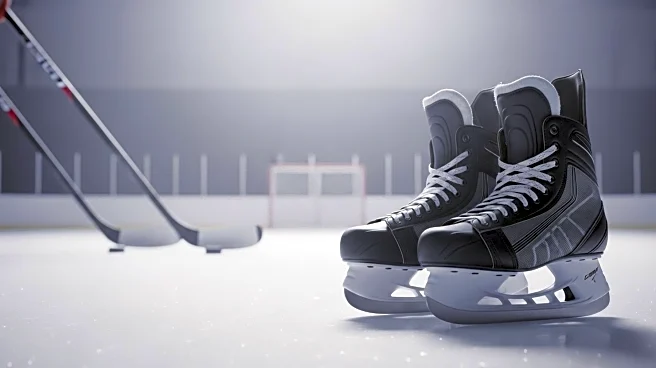What's Happening?
Connor Dubeau, a high school hockey player from Smithtown West, Long Island, has made a remarkable recovery after a near-death experience. Last month, Dubeau suffered a severe accident at Gilgo Beach, where he slipped, fell into the water, and broke the C-4 bone in his neck, leading to temporary paralysis. His friends, Kevin Bonino and Jake Geller, played crucial roles in saving his life by pulling him out of the water. After undergoing neck surgery, Dubeau was able to walk out of the hospital in just over two weeks. His recovery has been attributed to his excellent physical condition maintained through hockey. The incident has drawn significant attention from the hockey community, with support from NHL players and legends.
Why It's Important?
This story highlights the resilience and community support surrounding young athletes. Dubeau's recovery is not only a personal triumph but also a testament to the strength of community bonds in sports. The involvement of NHL players and the broader hockey community underscores the sport's camaraderie and the impact of positive role models. This event may inspire other young athletes to prioritize physical fitness and community support, emphasizing the importance of teamwork both on and off the field. The story also raises awareness about safety measures and emergency preparedness in sports and recreational activities.
What's Next?
Connor Dubeau is expected to continue his recovery and gradually return to his normal activities, including attending school and participating in hockey practices. His story may lead to increased safety protocols at recreational sites like beaches and sports facilities. The support from the hockey community is likely to continue, potentially leading to further engagement with young athletes and initiatives promoting safety and health in sports. Dubeau's experience may also inspire other athletes to share their stories, fostering a culture of resilience and mutual support.
Beyond the Headlines
The incident involving Connor Dubeau highlights the critical role of emergency response and preparedness in preventing tragedies. It also brings attention to the psychological and emotional aspects of recovery, as seen in the support from friends and the hockey community. This story may encourage discussions on mental health support for athletes recovering from traumatic experiences. Additionally, it underscores the importance of having trained individuals present during recreational activities to respond effectively in emergencies.











